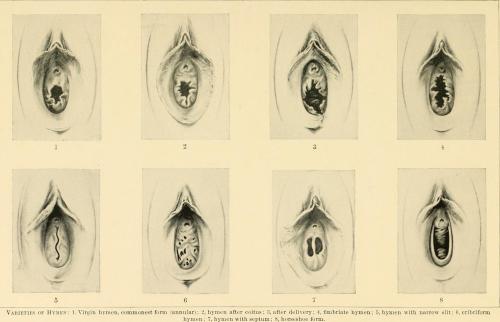The mythical hymen and her "recovery operation"
 "Are you still a virgin?" "When were you deflowered?" There is a lot to do about the first time sex. We have to take guys' word for it, but girls are supposed to prove that there has never been a penis in their vagina. "Is the hymen intact," the question is, especially among families who consider it important that a married woman has never had sex before - often for religious reasons. Sometimes girls are urged to have their hymen "repaired" surgically.
But. Stop. Hold on.
Dit alles berust op een flink aantal mythes. Wil je meer weten over het maagdenvlies, zo’n hersteloperatie en überhaupt het concept ‘maagdelijkheid’? Lees dan verder.
"Are you still a virgin?" "When were you deflowered?" There is a lot to do about the first time sex. We have to take guys' word for it, but girls are supposed to prove that there has never been a penis in their vagina. "Is the hymen intact," the question is, especially among families who consider it important that a married woman has never had sex before - often for religious reasons. Sometimes girls are urged to have their hymen "repaired" surgically.
But. Stop. Hold on.
Dit alles berust op een flink aantal mythes. Wil je meer weten over het maagdenvlies, zo’n hersteloperatie en überhaupt het concept ‘maagdelijkheid’? Lees dan verder.
Facts and fables
Let's separate the facts from the fables first. What exactly is the "hymen"? Since it is called a membrane, we often think it is a type of membrane that blocks the entire vagina entrance. At the first penetration, it would then tear, releasing blood, so it could be seen whether a girl was still a virgin. Some are concerned that this "web" may break or tear when exercising or inserting a tampon or finger. All of this is not true.
1. It is not a membrane.
The hymen is not a "membrane", which is why I prefer to call it by its other name, "hymen" (it is also called the vaginal corona, but this term has a completely different charge at this time ...). In almost all women, the hymen is no more than a smooth edge of tissue, 1-2 cm inside the vagina. For most women, it is a soft, stretchy, slightly thicker piece of skin. Everyone looks different (just like everyone's nose is different, for example), as in the examples below. Occasionally it covers the entire vagina entrance: therefore no menstrual blood can pass through it, and certainly no finger or tampon (in which case a gynecologist often has to be used to open it).

2. It usually does not tear or bleed on initial penetration.
Because it is a supple piece of tissue, hymen does not tear the first time the vagina is penetrated (nor does it break when riding or tampon). Most women don't bleed the first time either. If they do bleed, it is almost always because there are small cracks in the skin of the vagina opening because the vagina is not moist or relaxed enough. So this has nothing to do with hymen, and can also happen after a woman has had sex 1000 times. If a woman is aroused enough, and does not have a problematic abnormality, her hymen will return to its original state in almost all cases after sex.
3. No one can look at the hymen and determine if a woman is still a virgin.
Hymen is not the same in any woman and nothing (in principle) is damaged when penetrated. How can someone else see if she has already had sex? Even in children, small notches can be in the hymen and it can be seen that it is not a smooth edge. In women who are still virgins, hymen is rarely without nicks. "Even the most experienced doctor cannot see or feel whether someone is still a virgin," say leading sexologists Ellen Laan and Rik van Lunsen. There are even women who have given birth to several children vaginally, who still have hymen without notches. Only if a vagina has been damaged up to a few days in advance, for example by sexual violence, can this be seen by a doctor.
The myth of the rupturing hymen mainly means that the sexual behavior of girls and women can be controlled and suppressed. It makes women less free in the interpretation of their own sexual life, and teaches them that their own body can betray them.
"Reparing" the hymen
It should be clear: a membrane that has never been there and what does not break cannot be repaired. Still, hymen repair surgery is a procedure that is sometimes performed. It will not be a problem for most women in the Netherlands if they get married while they have had sex before, but for some it can have disastrous consequences. If traditional (in-laws) families are aware of any previous deflowering, these women are at risk of gossip, violence, or rejection - even if the "deflowering" has been a rape. These women (and their families), sometimes voluntarily and sometimes forced, ask a doctor for a repair operation. In the Netherlands, these operations are mainly performed in commercial cosmetic or plastic private clinics, or in the country of origin.
What will be done during such an operation, if there is nothing to repair? The surgeon folds the tissue of the vaginal wall with one or more small stitches. Then, when a penis passes, the stitches break or the tightened tissue tears, and a few drops of blood are released. In theory. Because there is no guarantee that it will actually bleed: the stitches may fall out earlier or the skin may still be too pliable to tear. So it is certainly possible that a woman who has undergone recovery surgery will not bleed on the wedding night.
There is a lot of criticism of these recovery operations: it is an unnecessary intervention, possibly without any result, some say; it is mutilation of a woman's body, others say. In February 2020, Minister de Jonge drew up a guideline for doctors' organizations to stop hymen repair operations. For some, this "guideline" does not go far enough, and an official ban is required. However, the Dutch Association for Obstetrics & Gynecology (NVOG) states that in the event of a ban, there is no longer any possibility to talk to women and girls. Because it is not so simple for many women and girls who ask for the operation. They are under great pressure, fear for their future and their safety, and are sometimes at a loss. Surgery, even if it does not guarantee bleeding, can provide psychological support to these women.
Should doctors then perform the recovery operation, or pretend to perform it, to help these women? Even if nothing is physically damaged, (sham) surgery does help maintain the hymen myth - and thereby suppress the female body. Doctors hereby confirm that this woman's virginity would have something to do with the condition of her vagina, rather than disproving this dangerous fable.
Alternatives to the surgery
If a woman insists on bleeding during the wedding night, this can also be done without surgery. She can prick or cut her finger and smear the blood on the sheet. There are also pills with a red liquid that can also be inserted into the vagina. These are available at a pharmacy. Surely there are many more tricks out there - since the majority of women don't bleed their first time and the "bleed from the first time" fable has lived on for centuries.
It may also be an option to obtain a medical certificate of virginity from a doctor if necessary for the (in-laws) family. General practitioners and various organizations (see for addresses www.seksualiteit.nl, www.rutgershuis.nl, www.sense.info or www.casa.nl) provide such evidence without conducting a physical examination. Every doctor in the Netherlands, including your own general practitioner, must observe professional secrecy and will never discuss this request with anyone else - not even with parents or a (future) spouse.
That said, these solutions also contribute to an ideology that is very damaging to girls and women. Fake bleeding or a virginity declaration perpetuates the myth of a non-existent membrane. Girls and women, and their families, would rather receive good information and guidance when they come to ask for surgery or an explanation. It is important that their concerns are taken seriously and not dismissed as nonsense. On a larger scale, there should be better information about the truths and falsehoods of virginity. For girls and their families, but also for boys: they know that when a girl does not bleed the first time, nothing is wrong (and it is good!).
Basically, if you've had sexual intercourse before and you don't want anyone to know this, don't worry, no one will be able to find out by looking at your body. If your family knows and is forcing you to have recovery surgery - see if your doctor or another doctor your family is familiar with can talk to them to debunk the myths.
Is virginity actually something?
While we are debunking myths, I would also like to talk about the concept of "virginity". What is that? When are you a "virgin"? If you've never had penis-in-vagina sex before? And what about gay or lesbian people - are they "virgin" all their lives? Are you still "virgin" if you have a finger in your vagina? Or a dildo? Or a penis? Where is the limit? What if you were blown? Has anything really changed about you once you have experienced penis-in-vagina sex? We now know that a hymen does not change, and by the way, what would change in a boy after "deflowering"?
All these questions show that the concept of "virginity" is not as simple as we usually use it. I am not in favor of the word "virgin" or "deflower". It suggests that you change, that something is taken from you when one specific kind of sex has been practiced - the kind that society has told us is the only form that really counts ... Is it up to society to determine? I don't think so. You are the only one who decides whether you are "deflowered" - or, in nicer words, whether you have already experienced your "sexual debut".
If you want to know more about the hymen and / or recovery operations, please contact your doctor.

Laura
sexpower.online
Datum: 06-05-'20
Terug naar overzicht
